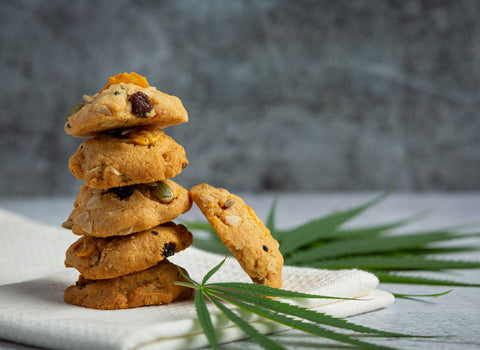
Tired of foggy focus wrecking your productivity? Science shows that microdosing cannabis can help you squeeze more out of your day by boosting your productivity.
Ditch the distractions and prepare to get laser-focused.


THC: 10 mg | CBC: 10 mg | CBD: 10 mg | CBG: 5 mg | CBN 5mg
While there’s not much research on the effects of cannabis on focus, we know that cannabis microdosing is great for your brain overall. Did you know cannabis can reverse age-related brain damage?
Or that microdosing could help dementia patients improve memory and cognition and stimulate brain plasticity?
Our low-dose THC gummies could provide subtle yet powerful mental boosts. We’re talking tiny doses that enhance creativity, alertness, and motivation minus the overwhelm.
Euphoria edibles are better than other branded Delta 9 edibles that I've tried. They appear to be sourced better or are more organic...not quite sure why the experience is smooth when compared to others. I like splitting them when needing to knock out chores around the house or watching suspense movies.
—LNB
What are cannabis edibles?
Edibles are cannabis products that contain small, precise amounts of cannabis compounds such as Delta 9 THC and CBD. Because our edibles contain between 2 and 10 mg of THC, they are the safest and most reliable method of consuming cannabis. (Definitely healthier than smoking and vaping.)
In fact, here’s why our cannabis edibles are the best way to consume cannabis:
- Ingested cannabis avoids the carcinogens and lung damage associated with smoking. This makes our edibles much healthier and safer.
- Our edibles deliver a precise dose of Delta 9, cannabidiol (CBD), and other cannabinoids and cannabis compounds. This means you know exactly how much you’re consuming every time.
- Edibles ensure a slow release of compounds into your system—you can feel the effects of our gummies anywhere between 30 minutes and two hours. Slower, yes, but also much safer. This way you avoid the intensity spike that comes with smoking other quick fixes, giving you more control over your experience.
- Our edibles contain natural flavors and ingredients. No toxins, pesticides, heavy metals, and other nonsense ingredients that can compromise your health and reduce the potency.
- They are super delicious.
All our cannabis edibles have been carefully crafted and tested in a third-party lab to ensure quality and safety. Our THC gummies and low-dose THC mixers contain high-quality ingredients and top-notch flavors that will turn your daily practice of microdosing into a delicious habit.
You heard it right: you can now drink your THC by infusing your favorite non-alcoholic beverages with tiny amounts of THC and CBD. Order our liquid Buzz drops and enjoy every invigorating sip. The best part is the therapeutic benefits and no psychoactive effects.
Before we delve into why our low-dose edibles are such good superchargers for boosting concentration, let’s take a look at the current research.
What does the research say?
Early studies do show that small amounts of cannabis can boost focus. However, rigorous scientific research is still hampered by prevailing cannabis prohibitions and legal constraints.
Here’s what we know about the research on cannabis and its effects on focus-related cognition:
- A 2020 study review looked at the effects of cannabis on the thinking abilities of people over 50 and older mice. While human studies showed inconclusive results (due to limitations), three studies on rodents suggested that “extremely low doses of THC improved cognition in very old rodents.” A bit higher doses administered regularly improved cognition in “moderately aged rodents.”
- A 2022 safety review of cannabis use on brain health reveals that a vast number of studies are focused on higher, even excessive doses. They show how chronic heavy cannabis use is associated with cognitive deficits, especially in memory, but there’s little focus on microdosing.
- The results of a 2023 study show that “low THC dose improved learning and cognition, suggesting dose-dependent effects of THC in vivo.” THC can impair cognition at higher recreational doses in humans, but low doses improve learning and memory in animal studies.
What does all of this mean?
- There is a definite need for further research in order to understand how cannabis impacts focus in older adults.
- While microdosing cannabis may have cognitive benefits, current research has mainly focused on higher recreational doses.
- Animal studies do show the benefits of cannabis on cognition (including memory, learning, and focus), but more human studies are needed to confirm these findings.
We could care less about those higher doses. We stick to microdosing and the sweet cognitive boost and mild euphoria it provides. Order our exotically-flavored Energy gummies (only 2.5 mg of THC per gummy) and see what we’re talking about.
Anecdotally, users do report notable cognitive benefits after microdosing THC and CBD: increased motivation, alertness, concentration, and the ability to stay on task.
Why are edibles great for boosted focus?
Microdosed edibles offer more health benefits than taking cannabis at unreliable higher doses. That’s particularly true when it comes to cognition. High doses of THC can leave you glued to the couch, feeling foggy and impaired, while microdosed edibles may offer subtler, more controlled effects, potentially enhancing focus and cognitive clarity.
Small amounts of THC (think anywhere between 2 and 10 milligrams per serving) may provide just enough stimulation of dopamine to increase your mental energy and motivation. Dopamine is a neurotransmitter responsible for feelings of pleasure, motivation, and the reward system. THC increases dopamine levels to produce a mild euphoria without the unwanted side effects.
The way THC is able to elevate dopamine is by interacting with our endocannabinoid system (ECS). This intricate network of signals and receptors keeps your body tuned up and running smoothly. When THC is present, it binds to CB1 and CB2 receptors (two main cannabinoid receptors in the ECS), kicking off a chain reaction:
- Through CB1 receptors, THC unleashes that signature “high” we all know.
- At microdoses, THC sparks just enough dopamine to amp up your motivation, creativity, and focus.
- Research shows THC tickles the mesolimbic dopamine pathway, your brain's built-in reward center. An increase in happy dopamine equals better mood, enhanced productivity, and less anxiety and stress. (Small amounts of cannabis are actually beneficial for your mental health, unlike higher doses.)
- Let’s not leave CBD out. Cannabidiol does not have psychoactive effects. It doesn’t even interact with the ECS in the same way as THC does. Instead, CBD counterbalances THC’s intoxicating effects and keeps you calm, collected, and zeroed in.
- CBD and THC also modulate other neurotransmitters to support sustained attention on cognitively demanding tasks. CBD boosts levels of anandamide, a neurotransmitter that plays a role in memory formation and recall. According to research, through CB1 receptors, CBD can regulate memory and motivation.
Try the best cannabis strains for razor-sharp focus and see if microdosing helps you get into the zone.
Just remember—start low and go slow. Our Bliss gummies contain the blissful five milligrams of THC to provide a microdose boost for optimized productivity. With precision THC and CBD ratios and slow-release delivery, these gummies are expertly crafted to keep you calmly concentrated for hours.
How do small amounts of cannabis affect the brain?
Cannabis affects the brain very differently at different doses. Precision low-dose edibles (like ours) are crafted to provide just the right amount of THC and CBD to boost motivation and creativity, protect against age-related damage, and soften the symptoms of neurodegeneration. Sky-high amounts may impair brain health over time.
Researchers have known about the neuroprotective quality of THC and CBD way back. A 1998 article discussed how low doses of cannabis promote the creation of neurons, also called neurogenesis.
20 years later, the European Journal of Clinical Investigation found that giving older animals low doses of THC regularly can help promote hippocampal neurogenesis, restore memory and cognitive function, deter memory loss, and make their brains work better.
…THC is also able to improve neurological function in old animals when chronically administered at low concentrations... THC paradoxically promotes hippocampal neurogenesis, prevents neurodegenerative processes occurring in animal models of Alzheimer's disease, protects from inflammation-induced cognitive damage and restores memory and cognitive function in old mice. (Calabrese and Rubio-Casillas)
It’s important to preserve neurons and connections to maintain cognitive horsepower as you age. That’s why we’re head over heels for the therapeutic effects of our low-dose edibles.
Microdoses of THC can reverse age-related declines
Neurogenesis and brain aging are closely intertwined. As we age, our brain naturally loses plasticity and its remarkable ability to create new neurons. In old age, the process of neurogenesis usually declines, and this may be directly responsible for age-related cognitive impairment.
Animal studies show microdoses actually bolster brain plasticity, restoring learning and memory levels in aging rodents.
The single injection of THC increased the level of Sirtuin1, an enzyme that has been previously shown to be involved in neuroprotection and neuroplasticity, in the hippocampus and in the frontal cortex of old mice, for at least 7 weeks. Magnetic resonance imaging demonstrated a larger volume and higher tissue density in various regions of the brain of THC-treated old mice.
Neurogenesis may decline and synapses may wither away when those “senior moments” start creeping in—but cannabis could hit pause on your aging brain. Calculated THC microdosing in our Sleep Plus gummies may help preserve the brain's natural plasticity and function.
Don’t let the name fool you; these edibles contain only 2 mg of THC with a balanced dose of CBD to help you maintain a sharp, agile mind as the years tick by. And it will help you sleep better—your brain sure does need a good night’s sleep.
Microdosing cannabis fights neurodegeneration
Neurodegenerative diseases such as dementia and Alzheimer's are ruthless in attacking memories and mental faculties. But THC and CBD may just help defend your neurons against the forces of neurodegeneration.
This dynamic duo not only protects brain cells from damage but also rescues cognition and reverses devastating symptoms. Here’s how:
- Neuroinflammation is one of the toughest enemies of cognition. Luckily, THC and CBD's anti-inflammatory effects may slow the progression of dementia and Alzheimer’s. The antioxidant and potent anti-inflammatory properties counteract the harmful effects of oxidative stress and neuroinflammation, protecting neurons and slowing neurodegeneration over time.
- THC and CBD also disrupt plaque buildup and clear out rogue proteins implicated in Alzheimer's disease. Patients report improved mood, cognition, and motor function with carefully calibrated cannabis microdoses.
- Low doses of THC were found to decrease irritability, resistance to care, shouting, physical aggression, and emotional distress in patients with Alzheimer’s. According to research, this calming effect comes from the interaction with the endocannabinoid system and serotonergic receptors involved in regulating mood and behavior.
When cannabis interacts with the ECS and serotonergic receptors, there’s an increase in serotonin. This important neurotransmitter regulates mood, sleep, cognition, and more. Serotonin boosts feelings of well-being and happiness while reducing anxiety symptoms. Cannabis edibles boost serotonin to enhance mood and motivation while supporting optimal brain function for sharper focus and clearer thinking.
Our memory-boosting Bliss gummies deliver cannabis compounds precisely dosed to elevate serotonin and keep your thinking crisp and clear. Don't let brain degeneration deflate your cognitive potential. Order from nama and fight back.
Microdose cannabis to lower anxiety and depression
At low doses, nearly all cannabis compounds produce anxiolytic and antidepressant-like effects: they alleviate the symptoms of anxiety and depression. If you’ve ever been slightly stressed or feeling down, you know how damaging that is for your brain, particularly focus and the creative flow.
Stress, anxiety, and poor mental health all hinder neurogenesis and could lead to neuronal death, harshing your productivity vibes. It’s a good thing then that low-dose edibles reduce anxiety and depression. (In contrast, higher THC amounts appear to enhance anxious behaviors.)
The THC-CBD combo modulates neurotransmitters like serotonin to curb anxiety, stress, and depression. The results of one review article show that cannabinoids may help people with clinical anxiety and depression feel less anxious and less depressed.
Read about the powerful ways cannabis banishes depression.
And then order our finest Energy gummies. Only 2.5 mg of THC will make you feel relaxed, 5 mg of CBD provides a clear-headed calm, while added L-theanine enhances alpha brain wave activity. These edibles will keep anxiety at bay, boost dopamine and serotonin, and pave the way for locked-in concentration.
Product QUIZ
Need help deciding what product is best for you? Take our quiz, just three questions until your perfect match!
What is the best THC dosage to increase your focus?
When it comes to boosting focus, we believe that less is more. Our edibles are packed with microdoses ideal for enhanced concentration and productivity. To harness these badass focusing powers, start with as low as 2 milligrams of THC. These tiny amounts can improve motivation, alertness, and clarity much better than higher doses.
Our edibles let you tap into the benefits of microdosing cannabis without the intense high.
Where to buy the best THC edibles
Are you looking for the best THC edibles out there? You’ve got to be smart about where you purchase your edibles. Skip the corner stores or shady brands and products that provide no third-party lab tests and no guarantee that their products are safe and effective.
You want the real deal: safe, third-party tested, quality Delta 9 edibles from reputable brands. Shop at nama and experience the best edibles to get your creative juices flowing. All organic, lab-tested for purity and potency, and expertly dosed edibles from premium American hemp await you.
Start with Relax Plus gummies with only 5 mg of Delta 9 THC to get a taste of THC's mellow vibes without the intense high. These gummies hit the sweet spot for total mind and body relaxation.
Since our edibles contain cannabis compounds derived from hemp, not marijuana, all of our THC edibles are federally legal in the US. Read more about the legality of Delta 9 THC.
Edibles FAQ
A microdose of THC typically ranges between 2.5 to 10 milligrams. Cannabis microdosing is about taking a minimal amount that doesn't induce strong psychoactive effects. That’s why our edibles are the best out of all consumption methods out there. They deliver a precise and effective dose in every gummy, so you can tailor your experience and find your perfect dose. No need to worry about unreliable dosing or negative side effects.
Keep in mind that what works as a microdose for one person might be different for someone else. Start low and gradually increase to find your sweet spot.
A 5 mg THC edible can bring a milder effect compared to larger doses. For some, it might be a gentle relaxation, a slight mood lift, or a subtle relief from symptoms of chronic pain or anxiety.
For other people, a 5 mg edible can be an ideal introduction to the world of microdosing, especially if they’ve never consumed cannabis before. If you’re looking for subtle relief and the opportunity to feel the potential benefits of cannabis while minimizing the risk of adverse effects, our Relax Plus gummies are the way to go.
The way edibles are metabolized in your body influences a wide range of organs. When you consume them, the cannabis compounds undergo a metabolic journey within the body, predominantly through the liver, before you can feel their effects.
They affect your heart, regulating heart rate and blood pressure. Edibles also show potential effects on the liver’s metabolic functions, improving insulin sensitivity, reducing fatty liver disease, and boosting metabolic rate.
While moderate use of edibles typically doesn't pose significant organ or health risks, excessive or prolonged consumption could potentially strain the liver due to the increased workload in processing the compounds. Consume cannabis responsibly, and always stick to low doses.
Cannabis microdosing is generally safe for everyone. However, certain people should avoid using cannabis altogether:
- If you’re a mom-to-be or a breastfeeding mom, avoid cannabis edibles until your doctor says it's safe for you and your newborn.
- If you’re managing certain medical conditions, consult with a healthcare professional before starting a microdosing practice.
- If you’re sensitive to certain cannabis compounds or ingredients from the edibles, it may be a good idea to steer clear of them.
Low doses of cannabis are the sweet spot for many cannabis lovers, offering a way to savor the benefits without the wild highs. Just remember, the secret is to ease in gradually and find that perfect dose for the ultimate cannabis experience.
The ideal time to microdose THC depends on your personal preferences and microdosing goals. It’s best to start with the lowest effective dose during times when it won't interfere with your daily life. Typically, evenings or weekends, when there are minimal responsibilities or commitments, can be ideal for microdosing.
For some, microdosing in the morning provides a gentle uplift throughout the day. Consider taking your low-dose THC product during times when you're managing anxiety or chronic pain, as it might provide relief without significant impairment.
Microdosing THC might be a suitable, effective, and safe solution for chronic pain management. It can offer medical benefits for chronic pain disorders such as neuropathy, fibromyalgia, migraines, and cancer pain without causing significant impairment or unwanted psychoactive effects. Microdosing during such situations might help manage pain while allowing you to remain functional and alert.
For tailored guidance on dosage and potential interactions, consult a healthcare professional, especially if you're using other medications or suffer from an underlying chronic condition.
Top Sellers
New? Start with our Ultimate Sampler!

THC: 10 mg | CBC: 10 mg | CBD: 10 mg | CBG: 5 mg | CBN 5mg
Resources
Pocuca, N., Walter, T., Minassian, A., Young, J. W., Geyer, M. A., & Perry, W. (2020, November 7). The Effects of Cannabis Use on Cognitive Function in Healthy Aging: A Systematic Scoping Review. Archives of Clinical Neuropsychology; Elsevier BV. https://doi.org/10.1093/arclin/acaa105
Testai, F. D., Gorelick, P. B., Aparicio, H. J., Filbey, F. M., Gonzalez, R., Gottesman, R. F., Melis, M., Piano, M. R., Rubino, T., & Song, S. Y. (2022, April). Use of Marijuana: Effect on Brain Health: A Scientific Statement From the American Heart Association. Stroke, 53(4). https://doi.org/10.1161/str.0000000000000396
Niloy, N., Hediyal, T. A., Vichitra, C., Sharma, S., Chidambaram, S. B., Gorantla, V. R., & Mahalakshmi, A. M. (2023, January 12). Effect of Cannabis on Memory Consolidation, Learning and Retrieval and Its Current Legal Status in India: A Review. Biomolecules; Multidisciplinary Digital Publishing Institute. https://doi.org/10.3390/biom13010162
Bloomfield, M., Ashok, A. H., Volkow, N. D., & Howes, O. (2016, November 1). The effects of Δ9-tetrahydrocannabinol on the dopamine system. Nature; Nature Portfolio. https://doi.org/10.1038/nature20153
Leweke, F. M., Piomelli, D., Pahlisch, F., Muhl, D., Gerth, C. W., Hoyer, C., Klosterkötter, J., Hellmich, M., & Koethe, D. (2012, March 20). Cannabidiol enhances anandamide signaling and alleviates psychotic symptoms of schizophrenia. Translational Psychiatry; Springer Nature. https://doi.org/10.1038/tp.2012.15
Calabrese, E. J., & Rubio‐Casillas, A. (2018, April 2). Biphasic effects of THC in memory and cognition. European Journal of Clinical Investigation, 48(5). https://doi.org/10.1111/eci.12920
Sarne, Y., Toledano, R., Rachmany, L., Sasson, E., & Doron, R. (2018, January 1). Reversal of age-related cognitive impairments in mice by an extremely low dose of tetrahydrocannabinol. Neurobiology of Aging; Elsevier BV. https://doi.org/10.1016/j.neurobiolaging.2017.09.025
Outen, J. D., Burhanullah, M. H., Vandrey, R., Amjad, H., Harper, D. G., Patrick, R. E., May, R. L., Agronin, M. E., Forester, B. P., & Rosenberg, P. B. (2021). Cannabinoids for Agitation in Alzheimer's Disease. The American Journal of Geriatric Psychiatry, 29(12), 1253-1263. https://doi.org/10.1016/j.jagp.2021.01.015
Stack, S. K., Wheate, N. J., & Schubert, E. (2022, April 23). Medicinal Cannabis for the Treatment of Anxiety Disorders: a Narrative Review. Current Treatment Options in Psychiatry; Springer Science+Business Media. https://doi.org/10.1007/s40501-022-00260-8
nama CBD FDA & legal disclaimer
Our products are not intended to diagnose, treat, cure, or prevent any disease. They are not a replacement for prescription medications and have not been evaluated by the Food and Drug Administration (FDA).
The information provided on this website does not and is not intended to, constitute legal advice or any statements of the status of any laws. Any information, content, and materials available on this site are for general informational purposes only and are not intended to be relied upon for any purpose.
Readers of this website should contact their attorney to obtain advice with respect to any particular legal matter including decisions on what products are, or are not, legal to sell, possess, or consume. No reader, user, or browser of this site should act or refrain from acting on the basis of information on this site without first seeking legal advice from their own counsel in the relevant jurisdiction.
Only your individual attorney can provide assurances that the information contained herein – and your interpretation of it – is applicable or accurate for your particular situation. Use of, and access to, this website or any of the links or resources contained within the site do not create an attorney-client relationship between the reader, user, or browser, and website authors, contributors, contributing law firms, or committee members and their respective employers.
About
Learn
Join us on this journey

© Copyright 2026 nama Products LLC. All Rights Reserved.
†These statements have not been evaluated by the Food and Drug Administration. These products are not intended to diagnose, treat, cure or prevent any disease. All information presented here is not meant as a substitute for or alternative to information from health care practitioners. Please consult your health care professional about potential interactions or other possible complications before using any product.
††The information provided on this website does not, and is not intended to, constitute legal advice or any statements of the status of any laws. Any information, content, and materials available on this site are for general entertainment purposes only, and are not intended to be relied upon for any purpose.

By clicking ‘Yes,’ you agree to our
Terms & Conditions and Privacy Policy
123 John Doe Street
Your Town, YT 12345
Store Hours
Sun: Closed
Mon-Fri: 9:00 - 17:00
Sat: 10:00 - 13:00
What to expect at pickup
Closed
Closing at 5pm
Closing at 5pm
Closing at 5pm
Closing at 5pm
Closing at 5pm
Closing at 1pm





![Euphoria Triple Berry [10ct]](http://www.namacbd.com/cdn/shop/files/nama_euphoria_triple_berry_pouch.png?v=1715286095&width=480)
![Euphoria Triple Berry [10ct]](http://www.namacbd.com/cdn/shop/files/nama_euphoria_tripleberry_nutrition_facts.jpg?v=1715873950&width=480)


![Buzz Drops™ [THC Drink Drops]](http://www.namacbd.com/cdn/shop/files/nama_thc_buzz_drops.png?v=1711412866&width=480)
![Buzz Drops™ [THC Drink Drops]](http://www.namacbd.com/cdn/shop/files/buzz-drop-wine-comparison.png?v=1736882023&width=480)
![Buzz Packs™ [THC and CBD Powder Drink Mix]](http://www.namacbd.com/cdn/shop/files/nama_buzz_packs_thc_drink_pack_white_background.png?v=1769586244&width=480)
![Buzz Packs™ [THC and CBD Powder Drink Mix]](http://www.namacbd.com/cdn/shop/files/Buzz_Packs_Label.png?v=1769586244&width=480)









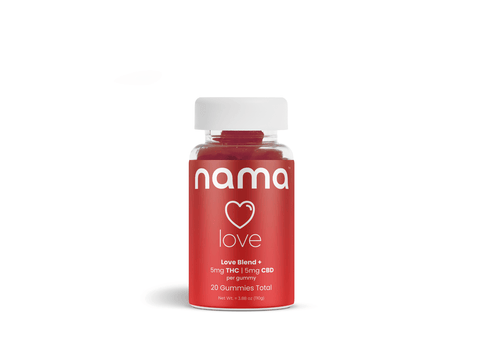
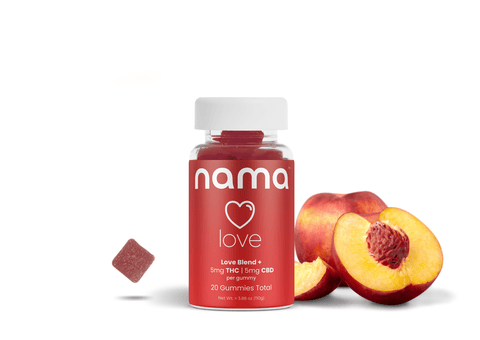


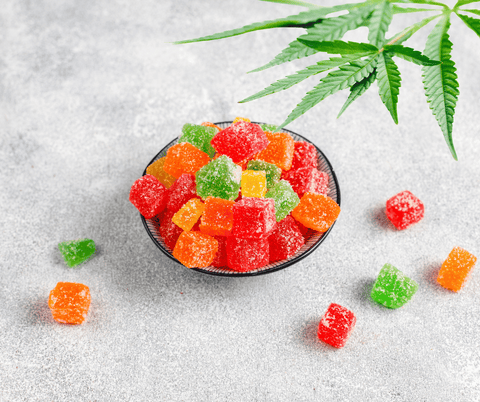
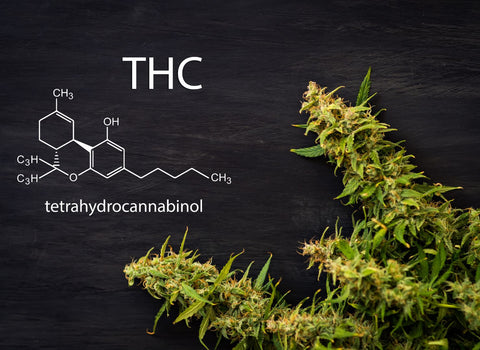

Comments (0)
There are no comments for this article. Be the first one to leave a message!